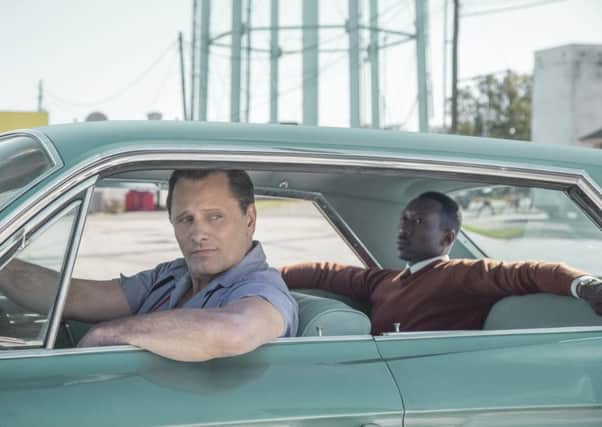Film reviews: Green Book | Can You Ever Forgive Me? | How to Train Your Dragon 3 | The Burning


Green Book (12A) **
Can You Ever Forgive Me? (15) ****
How to Train Your Dragon: The Hidden World (PG) ***
The Burning (15) ****
If the recent Oscar successes of 12 Years a Slave and Moonlight suggested the Academy Awards were becoming more racially progressive, culturally sensitive and artistically minded, the sudden elevation of Green Book to one of this year’s front-runners feels like a step backwards. Specifically, it feels like a step back in time to 1990, when Driving Miss Daisy won the Oscar for Best Picture. Like that film, it is based on a true story and uses the relationship between a lowly chauffeur and his well-to-do boss to conjure up a comforting myth about the possibility of racial enlightenment – only in this instance the chauffeur is a crude Italian-American former nightclub bouncer called Tony “Lip” Vallelonga (Viggo Mortensen) and his boss is Dr Don Shirley (Mahershala Ali), a refined African American classically trained pianist he’s been hired to drive around the Deep South of 1962. If that switch in the status of the protagonists is supposed to be a sign of progress, however, it’s one that’s completely undermined by the film’s decision to tell the story of a black artist living through an incendiary, very dangerous and very complex time through the dumbed-down perspective of an uncultured white protagonist whose own status as the savant-like saviour becomes the film’s driving narrative. Co-written by Tony’s son, Nick Vallelonga, the film certainly burnishes his father’s legacy, showing him quickly overcoming his own prejudice so we understand not only that he’s really a nice guy, but, thanks to his own lowly street smarts, is actually more in touch with black culture than his high-minded employer – a problematic assumption the film’s director and co-writer Peter Farrelly (Dumb and Dumber) never really challenges. True, Ali acts the hell out of his role, but his interpretation of the character is too constrained by the anti-intellectual lens through which we’re being forced to view him.
Based on the true story of literary forger Lee Israel, Can You Ever Forgive Me? provides Melissa McCarthy with a dramatic role worthy of her considerable talent for playing brash, socially confrontational outsiders. That talent has hitherto been amply demonstrated in comedy hits like Bridesmaids and The Heat, but here the she gets to walk a more nuanced line between acting unacceptably for comic effect and doing so because her character’s deep-rooted pain has caused social niceties to crumble. The film is set in the early 1990s when Lee, a talented biographer and magazine journalist, was struggling to make ends meet. Having been fired from her job as a proof-reader, her agent makes her painfully aware of the fact that she’s out of step with an increasingly corporate publishing industry that requires writers to be PR-conscious personalities whose ability to sell themselves is almost as important as their ability to craft a sentence. That’s an especially acute problem for someone whose talents lie in their ability to inhabit their subject, not write revealingly about themselves. Nevertheless, when she discovers that collectors will pay good money for juicy private correspondence from the rich and famous, she puts that talent to more profitable use defrauding an industry that doesn’t always recognise authenticity when it sees it. The film, directed with unobtrusive sharpness by Marielle Heller (The Diary of a Teenage Girl), revels in the low-tech minutiae of Israel’s increasingly elaborate criminal enterprise, and it delights too in the relationship she forms with kindred spirit Jack Hock (Richard E Grant), a former acquaintance whose own hand-to-mouth existence as an ageing gay man chimes with her existence as an ageing gay woman at a time of great discrimination. Both McCarthy and Grant have been Oscar-nominated and rightly so: their camaraderie – fuelled by daytime drinking sessions – is a hoot, at times recalling Withnail and I. But it’s also laced with sadness, with subtextual allusions to the Aids crisis ensuring that the film is no mere acting showcase, but also a richly observed portrait of New York and the outsiders who play such a vital part in sustaining the creative life of the city.
Advertisement
Hide AdAdvertisement
Hide AdHow to Train Your Dragon: The Hidden World is the third and final instalment of the popular animated franchise that began back in 2010 with the delightful story of Hiccup, a hapless Viking kid who discovers that everything his people know about dragons is wrong after befriending the most feared fire-breather in the land. Like its immediate predecessor, which darkened the story in ways both intriguing and conventional, the new film honours the real-time progress of the characters by setting the story almost a decade on from the first film and trying to subvert expectations with a plot that taps into the complicated emotions of its protagonists. In this case, writer-director Dan DeBlois zeroes in on the evolving relationship between Hiccup (once again voiced by Jay Baruchel) and Toothless (his pet dragon), to explore the way childhood friendships diverge when the pressures of adulthood come calling. It’s a worthy concluding chapter, especially when Toothless falling in love leads to an unexpectedly bittersweet twist.
Based on a short story by Haruki Murakami, South Korean drama Burning begins as an enigmatic, beautifully shot and acted relationship drama, but gradually morphs into an even stranger murder mystery that becomes more psychologically intense the more ambiguous it becomes. Director Lee Chang-dong has complete mastery of the tone here and he gets great, subtle performances from his cast. ■